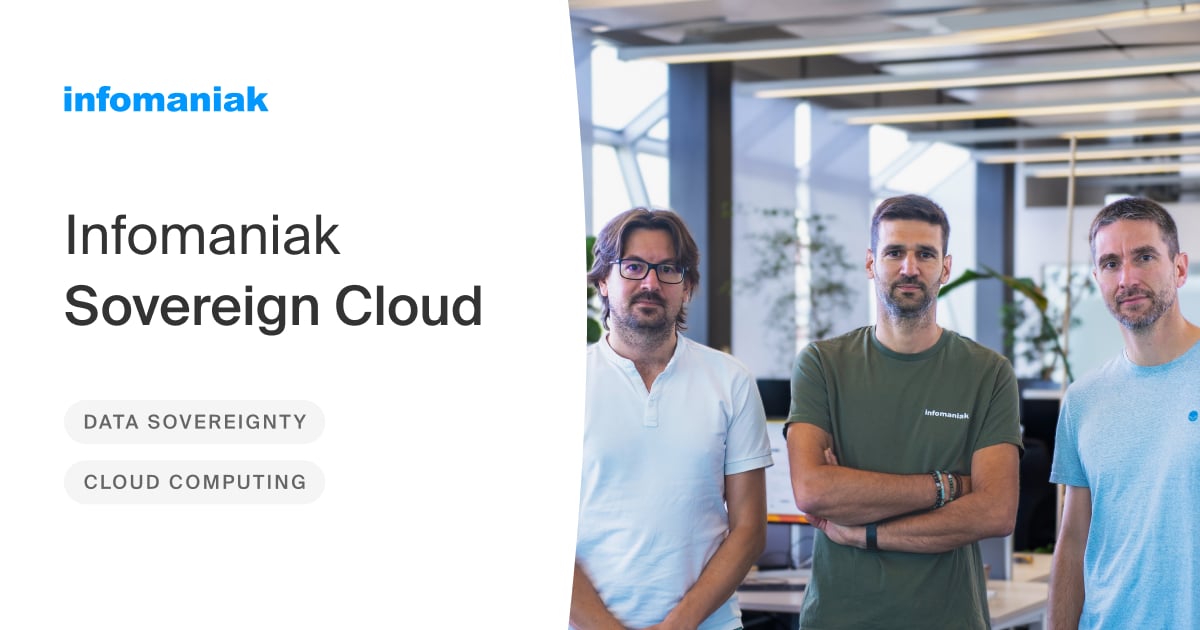Our servers are gradually being equipped with next-generation SSDs designed and produced entirely in Switzerland and Germany by the company Swissbit. We also call on the Neuchâtel-based specialist, Meyer Burger, to supply our solar panels.
The general public are often unaware of SSDs, despite the fact they are what drive the development of the cloud services. Jan Keitel, Global Account Manager at Swissbit
Relocating a strategic industry in Europe
With 100% of the economy moving towards the cloud, flash storage solutions (SSD) are essential. They are used in increasingly demanding and sensitive environments (energy, medical, finance, etc.) and are disseminated through connected objects (IoT), which network society’s activities. Like other industries such as solar panels, building a flash storage industry is important to the future of our economy.
Infomaniak data centers are equipped with NVMe SSDs developed in Switzerland and Germany by the company Swissbit. The company transforms, assembles and manufactures all its products in its Berlin plant.

Local players have the potential to rival the main operators on the market
Should we be ashamed of “SSDs made in Europe” compared to those of manufacturers such as Samsung or Intel? No. On the contrary. The SSDs produced by Swissbit prioritise quality and durability. They incorporate a more accomplished and high-performance technology, which has a beneficial affect on total operating costs.
Flash storage represents a challenge. Whether they are generic or specialised, most SSDs available on the market quickly deteriorate. In a data center, this deterioration can reach 50 to 75% in just a few months, due to the high demands placed on them. Despite the promises made, the durability announced by the manufacturers is often not realistic in light of the behaviour on site and the highly unpredictable latency. Ultimately, the total implementation cost becomes very high. Ecologically speaking, this limited service life makes no sense.


SSDs that outclass the market leaders
Swissbit SSDs go far beyond the usual performance and reliability standards with performances that are 2 to 5 times better in steady-state output. Hansjuergen Binner, Technical Account Manager at Swissbit
The close proximity with the local customers makes a decisive difference to the technology and design: the SSDs are adapted to the actual final activity of the customers.

- With regard to transport, the priority optimisations are resistance to large temperature differences (-40°C to 85°C) and power cuts as well as the protection of data access.
- In the medical sector, SSD reliability is essential, and they are in particular protected against wear by means of read/write intensity modes.
- For data centers, optimisations are achieved by analysing the real load calculation data (big data, streaming, storage, etc.), and not based on theoretical benchmarks.
As a cloud provider, this progress makes it possible to optimise SSD performance and extend the component replacement cycles. It is with this in mind that we have extended the service life of our servers to 15 years. In doing so, we reduce the carbon footprint linked to the production of the equipment accordingly.
Technological competence: rethinking the production chain
To develop our digital sovereignty, we require a combination of hardware competence, software competence and economic independence. This independence is necessary to the European industrial fabric:
The demands of European customers mean striking a balance between chip design, firmware and production technology. Jan Keitel, Global Account Manager at Swissbit

In the high-technology sector, the slightest thing can destabilise the supply chain underpinning the global economy. The strategic sector of semi-conductors clearly illustrates the phenomena of dependences. Companies in Taiwan depend on machines designed exclusively in the Netherlands to manufacture the semi-conductors that they are the only ones in the world to produce.
Each continent should develop its own technological and industrial production expertise as quickly as possible. Boris Siegenthaler, Infomaniak’s founder and Head of Strategy
Increasing the resilience of the supply chain
Like Infomaniak, Swissbit also prioritises local suppliers:
We enhance the resilience of our supply chain as far as possible by constantly increasing the proportion of European suppliers. Hansjuergen Binner, Technical Account Manager at Swissbit
Swissbit focusses on a strategy of having a second supply source in Europe for all components in general such as the NANDs, the housings, the plates, the PCBs, etc. In the near future, some of the flash memory controllers will be manufactured in Dresden, Germany.

Swissbit is constantly increasing the proportion of renewable energies it uses, as with the installation of solar panels on the roof of its plant in Berlin. Natural gas for the boiler room is gradually being replaced by heat pumps. Swissbit has also adopted an environmental impact management system in order to continue improving its energy performance and reducing its carbon footprint from waste and transport.
Find out more
Prioritising quality code : explanations and solutions for repaying the technical debt
Friday August 11th, 2023
Understanding ISO certifications: what are they for and are they really useful?
Monday May 22nd, 2023

 Français
Français Deutsch
Deutsch Italiano
Italiano Español
Español





You must be logged in to post a comment.